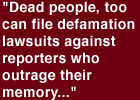| Signed into law on December 23, 1991 by President Lassana Conte, Guinea’s Press Code stipulates that freedom of expression can only be restricted by the necessity to respect human dignity, maintain public order, and safeguard national security.
Under Article 14, three copies of each edition of every newspaper must be submitted to the competent legal, administrative, and judiciary authorities four hours before distribution. Failure to submit copies within the prescribed time frame is punishable by a US$500 fine. Journalists found guilty of crimes against state security, or complicity with the enemy in times of war, can be jailed for up to five years. Under Article 26, publishers face sedition charges if they fail to disclose the production and distribution schedule of their newspapers to the authorities at the start of every electoral campaign. Journalists accused of defamation during an election period must respond to court summonses within 24 hours. At other times, they have up to two weeks to comply. Furthermore, while stating that “the protection of confidential sources of information is a matter of professional ethics for journalists,” Article 51 compels reporters to reveal sources if asked to do so by the state prosecutor’s office. Defamation of the head of state, for which lawsuits can be filed by the state prosecutor without presidential consent, carries a one-year prison sentence and a US$1,200 fine. Defamation of “the judiciary, the Army, members of parliament, government and public administration officials” is punishable by a one-year prison term. The 1991 Press Code makes it clear that truth is no defense in libel cases if the facts relate to the defendant’s private life. As a matter of legal principle, the state prosecutor assumes that every instance of defamation is criminal in its intent unless proven otherwise. As a result, libel cases in Guinea are all criminal by definition. Journalists found liable in civil defamation suits filed by private citizens can be jailed for between 16 days and six months; fines range as high as US$700. Dead people, too, can file defamation lawsuits against reporters who outrage their memory, either by misquoting them or by publishing false information about them. The press code does not specify who or what institution may file the complaint on the dead person’s behalf. Defamation of “an ethnic group, a nation, a race or religion” is punishable by up to two years in jail. Publishing “false news and fabricated quotes” carries a sentence of three years in jail and a US$4,000 fine. “Indecent comments” are banned under Article 73; violations carry a two-year prison sentence. Guinea’s National Communications Council (CNC) was established in December 1991; part of its mandate is to enforce the Press Code. According to Article 2 of its charter, the CNC is committed to “protecting the rights of citizens to access information, preventing an abusive control of state media by the government, and hampering manipulation of public opinion by means of the media.” Finally, the CNC is charged with monitoring “the processing of information by journalists” in order to ensure “quality and diversity.” The CNC has sole power to issue (and revoke) press cards to local and foreign journalists. Journalists applying for a press card must provide a copy of their criminal record, among other documents. They are expected to return their press cards to the CNC if they quit the profession. Under the CNC’s charter, the local press association may only nominate one out of nine board members, and that member must leave daily journalism before joining the board. The president of Guinea nominates three members, the Supreme Court nominates one member, and the other four are nominated by various trade associations (representing the film and publishing industries, postal and telecommunications workers, bookstore owners, archivists, and librarians). |
